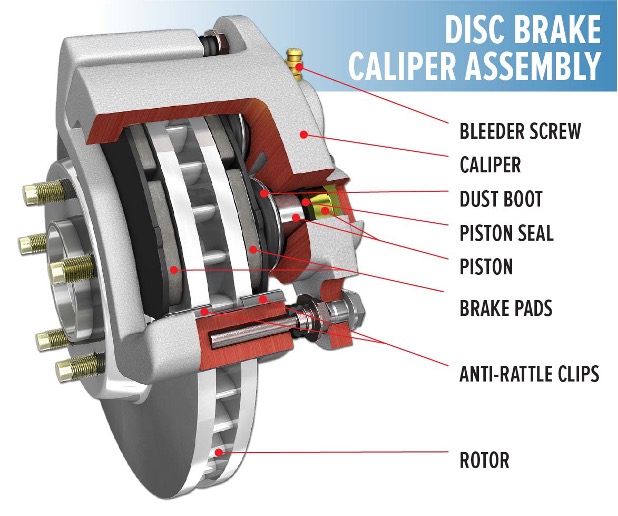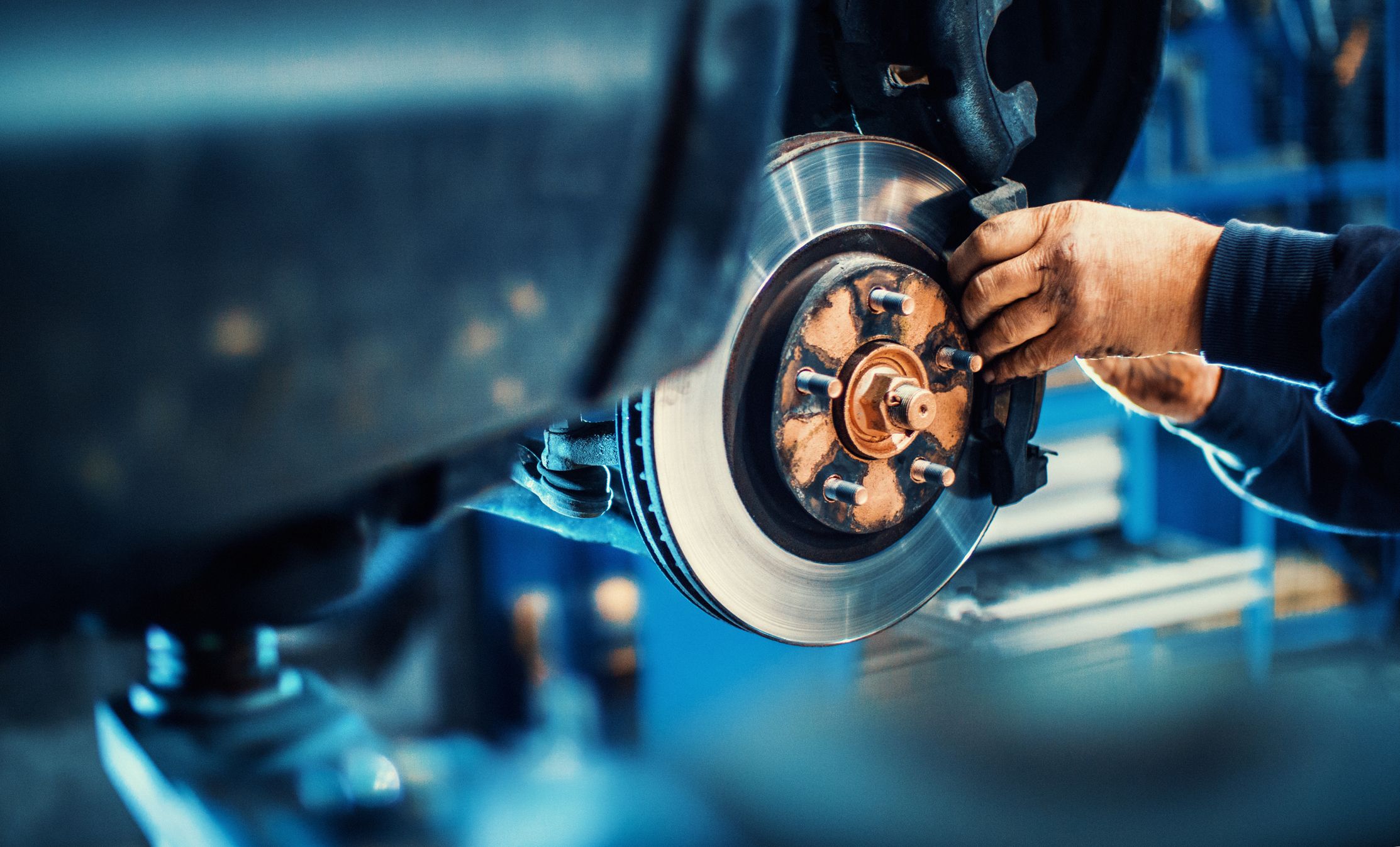Motorhomes, like automobiles, need regular maintenance to be used safely. The main difference between a motorhome and a vehicle is its rare usage. It is especially relevant to the performance of a motorhome’s brakes.
Do you have bad brake caliper symptoms in your RV? To understand how a brake caliper works, drivers must first grasp how their vehicle’s disc brakes operate.
How The Brake System Works
When a driver presses the brake pedal, the car changes the kinetic energy from the wheels turning into thermal energy (by friction). The moment you push down on the brake pedal, the foot force multiplies stronger due to the brake booster. The brake booster sends the power to a piston inside the master cylinder.
A piston in the master cylinder forces brakes fluid into the lines that supply each wheel’s brakes. After that, the brake fluid makes the brakes work, which makes the brake caliper squeeze the disc and slow the car down. Finally, the brake caliper squeezes the brake pads toward the metal disc until the vehicle slows down.

Bad Brake Caliper Symptoms: Motorhome Brake Calipers Seized
If you hear a lot of noise from your motorhome’s brakes after a few kilometres, it might be due to bad brake caliper symptoms. When the brakes are pressed, the brake caliper is effectively a piston that pushes the places against the disc. When your foot is away from the brake pedal, and the caliper piston is not pressing on the pads, the rotation of the brake disc should push it away from the disc’s surface.
When the brake caliper faults, the clips that allow the pads to move back and forth might seize. As a result, even when your foot is not on the brake pedal, the pad is still in contact with the disc. It causes the pad to wear out prematurely. It also causes excessive heat build-up and causes the brake pad to denature, resulting in cracking and delamination.
It implies that the brake pad separates from its metal backplate. Excessive heat build-up might also cause breakage in the discs themselves. As a result, brake pads get seized against the disc often means that both the pads and the discs must be changed. It’s also a good idea to replace the pads/discs on both sides. If you don’t, you may notice that braking is more difficult on one side of the RV than the other. As a result, upon strong braking’s, such as an emergency stop, the RV may pull to one side.
Repairing Bad Brake Caliper Is More Expensive
Having a seized brake caliper on the vehicle is a frightening experience until the wrong is figured out. For example, suppose you notice smoke coming out of the engine room of your RV or motorhome while driving, and you realize that it is the brake faulting. You might have thought it could have been a minor issue and you could continue till the next repair shop, unaware that it could be a bad brake caliper symptom.
After a few kilometres, the brake pads and disc will turn quite hot. At the shop, the mechanic declares it to be a bad caliper, and the pads must be replaced and the calipers. Let us remind you that the pocket pinch for replacing the calipers will make you worry a lot as these parts are vehicle specific, and thus, it becomes more expensive to procure.
Five Signs That Your Brake Caliper Needs Repair
Unlike brake pads, which wear out regularly over time, brake calipers are designed to last the vehicle’s life. However, this does not always occur. When the brake caliper fails, the brake pads wear out more quickly than usual. If your vehicle exhibits bad brake caliper symptoms, take it immediately to an auto expert repair shop for an accurate diagnosis and repair!
1. When Driving or Braking, The Vehicle Pulls to One Side.
Is the vehicle pulling or steering to one side while in operation? The master cylinder’s hydraulic pressure causes pistons in the braking caliper to move in and out. If the pistons get clogged owing to debris or rust, the brake pads will either fail to release the rotor or will fail to contact the rotor.
In the first situation, the vehicle will tend to the side with the damaged caliper. The car will move away from the injured side if the brake pad does not contact the rotor. It might happen while applying the brakes or during regular operation.
2. Metallic Rubbing Noises or High-Pitch Squealing
A noise from the damaged element is another sign of a stuck or frozen brake caliper. If the noise is caused by the brake calipers rather than the brake pads, it will occur while driving, while brake pad difficulties will generate a noise when the driver uses the brakes. Take the RV to a repair shop as quickly as possible since a frozen or blocked caliper may cause the brakes to lock up.
3. Brake Pads Wear Unevenly
New brake pads should provide at least as much service life as the old ones when you take your automobile in for service. However, you may discover that your brand-new pads wear unevenly, requiring replacement earlier than intended. If one side of the car’s brake pads seems thinner, the braking caliper may be faulty. Bring the vehicle to an auto repair shop and have a skilled mechanic inspect it.
4. Brake Fluid Leak on the Ground Inside the Tires
To operate modern braking systems, hydraulic pressure is used. If the caliper leaks, drivers may see an oily mark on the ground inside the tire. This, however, may not be the caliper at all. To thoroughly diagnose and correct the issue, consult with a qualified specialist.
5. Clunking Noise
It is a far less frequent symptom than the others, although it is conceivable that the bracket that keeps the brake caliper in place is defective. The fractured frame makes a loud clunking sound when operating in certain circumstances. If this occurs, do not operate the car. The brakes might lock up, putting the driver and other motorists in danger of severe harm.

What Makes a Brake Caliper Stick?
The symptoms listed above point to a clogged or malfunctioning brake caliper. What, however, causes the brake caliper to stick under these circumstances?
Slides for Calipers
The slots in the brake caliper retain the brake pads. When the driver applies pressure to the brake pedal, it moves in and out when the driver releases the brake. Drivers may have trouble stopping if the brake pads get stuck in the grooves and exhibit bad brake caliper symptoms. The brake pads may get stuck owing to debris, but if clearing out the tracks does not fix the issue, the grooves may wear out. If this is the case, the calipers may need to be replaced entirely.
Bolts for Caliper
The brake caliper bolts have slides as well. Rubber boots cover the slides to keep them greased. However, the rubber boots sometimes rip, causing the bolts to dry out. If this bad brake caliper symptom occurs, the brakes may get stuck. Allow a certified technician to inspect the brake assembly to determine whether the bolts need to be reconditioned or replaced.
Piston Caliper
The caliper piston might be to blame. The caliper piston, like the bolts, has a rubber boot around it to protect and lubricate it. If the rubber boot splits, rust and other debris will progressively accumulate within the piston. The brake caliper may get stuck in this situation. If this is the case with such bad brake caliper symptoms, the whole brake caliper assembly will most likely need to be replaced.
Brake Hose
The brake hose on a vehicle might wear out over time. If this bad brake caliper symptom occurs, the brake fluid may only flow in one direction, causing the brake pads to slow the car. However, when the driver does not engage the brakes, the fluid cannot flow in the opposite direction, resulting in a jammed caliper. It is a challenging problem to diagnose, but a competent technician should be able to pinpoint the issue with the brake caliper.
Finally, Use Caution.
You may avoid many of these issues if you maintain your brakes consistently. Nonetheless, we suggest you get your calipers examined by a local mechanic at the first indication of bad brake caliper symptoms.
Not taking seriously the significant risks posed by faulty or failed brakes is reckless. Instead, maintain the vehicle’s brakes and visit an auto expert regularly. Replace the brake pads and fill up the brake fluid as required.
If issues with the brake caliper arise, take the car to an expert immediately, and do not risk the situation to mere speculation on a subject in which you are not an expert.

